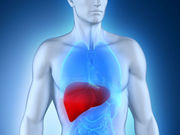No difference in autoimmune recurrence, liver graft, or patient survival using first-degree donors
MONDAY, April 25, 2016 (HealthDay News) — In liver transplantation (LT), patients who receive living donor grafts from first-degree relatives due to autoimmune liver diseases are not prone to increased disease recurrence, compared to those who receive grafts from distant/unrelated donors and deceased donors, according to a study published online April 18 in the American Journal of Transplantation.
Aloysious D. Aravinthan, M.B.B.S., of the University of Toronto, and colleagues studied 263 patients who underwent a first LT in the Toronto liver transplant program between January 2000 and March 2015 for autoimmune liver diseases. Patients had at least six months of post-LT follow-up.
The researchers found that 72 patients (27 percent) received a graft from a first-degree living-related donor, 56 (21 percent) from a distant/unrelated living donor, and 135 (51 percent) from a deceased donor. Recurrence occurred in 20 percent of patients. Source of LT did not significantly affect recurrence rates. Similarly, the source of the liver did not significantly affect time to recurrence, recurrence-related graft failure, graft survival, or patient survival.
“This study indicates that recipients with autoimmune liver diseases, who receive grafts from first-degree relatives are not disadvantaged by increased disease recurrence, reduced graft survival or reduced patient survival compared to those who receive grafts from distant/unrelated donors and deceased donors,” the authors write.
Copyright © 2016 HealthDay. All rights reserved.








